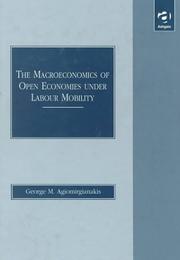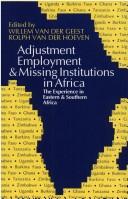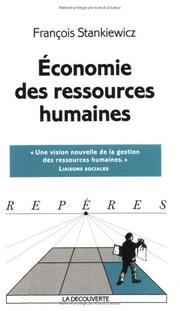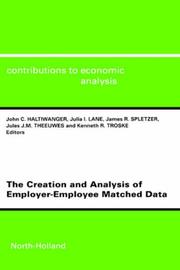| Listing 1 - 10 of 11 | << page >> |
Sort by
|

ISBN: 007046040X Year: 1999 Publisher: Boston : Irwin/McGraw-Hill,
Abstract | Keywords | Export | Availability | Bookmark
 Loading...
Loading...Choose an application
- Reference Manager
- EndNote
- RefWorks (Direct export to RefWorks)
Book
Abstract | Keywords | Export | Availability | Bookmark
 Loading...
Loading...Choose an application
- Reference Manager
- EndNote
- RefWorks (Direct export to RefWorks)
Social security --- Labor economics --- Sécurité sociale --- Economie du travail

ISBN: 2020354233 Year: 1999 Volume: E44 4 Publisher: Paris : Editions du Seuil,
Abstract | Keywords | Export | Availability | Bookmark
 Loading...
Loading...Choose an application
- Reference Manager
- EndNote
- RefWorks (Direct export to RefWorks)
Labor market --- Labor --- Marché du travail --- Travail --- Économie du travail --- Économie politique --- Flexibilité du travail --- Marché du travail --- Travail. --- Économie du travail. --- Économie politique. --- Flexibilité du travail.
Book
Year: 1999 Publisher: Antwerpen : Handelshogeschool,
Abstract | Keywords | Export | Availability | Bookmark
 Loading...
Loading...Choose an application
- Reference Manager
- EndNote
- RefWorks (Direct export to RefWorks)
Social ethics --- Labor economics --- Morale sociale --- Economie du travail --- Claeys, R.-H.

ISBN: 0444501878 0444501886 0444501894 0444822895 9786611025328 1281025321 0080544185 9780444822895 Year: 1999 Volume: 5 Publisher: Amsterdam: Elsevier,
Abstract | Keywords | Export | Availability | Bookmark
 Loading...
Loading...Choose an application
- Reference Manager
- EndNote
- RefWorks (Direct export to RefWorks)
Modern labor economics has continued to grow and develop since the first volumes of this Handbook were published. The subject matter of labor economics continues to have at its core an attempt to systematically find empirical analyses that are consistent with a systematic and parsimonious theoretical understanding of the diverse phenomenon that make up the labor market. As before, many of these analyses are provocative and controversial because they are so directly relevant to both public policy and private decision making. In many ways the modern development in the field of labor economics co
331 --- Labor economics --- Economics --- 331 Arbeid. Labour economics. Arbeidseconomie --- Arbeid. Labour economics. Arbeidseconomie --- Business & Economics --- Labor & Workers' Economics --- Économie du travail. --- Labor economics.

ISBN: 1840149493 Year: 1999 Publisher: Aldershot, Hants, England ; Brookfield, Vt. : Ashgate Pub.,
Abstract | Keywords | Export | Availability | Bookmark
 Loading...
Loading...Choose an application
- Reference Manager
- EndNote
- RefWorks (Direct export to RefWorks)
Foreign workers --- Labor mobility --- Emigration and immigration --- Labor economics. --- Travailleurs étrangers --- Main-d'oeuvre --- Emigration et immigration --- Economie du travail --- Mathematical models. --- Modèles mathématiques --- Mobilité
Book
ISBN: 2738484085 Year: 1999 Volume: *6 Publisher: Paris Montréal L'Harmattan
Abstract | Keywords | Export | Availability | Bookmark
 Loading...
Loading...Choose an application
- Reference Manager
- EndNote
- RefWorks (Direct export to RefWorks)
Bezoldigingen --- Lonen --- Loon --- Salaire --- Salaires --- Salarissen --- Traitements (Salaires) --- Vergoedingen --- Wages --- Wedden --- Industrial organization (Economic theory) --- Production (Economic theory) --- Value --- Income --- Profit --- Labor economics --- Economie industrielle --- Production --- Valeur --- Revenu --- Economie du travail

ISBN: 9221108589 Year: 1999 Publisher: Geneva : International Labour Office,
Abstract | Keywords | Export | Availability | Bookmark
 Loading...
Loading...Choose an application
- Reference Manager
- EndNote
- RefWorks (Direct export to RefWorks)
Labor market --- Labor economics --- Marché du travail --- Economie du travail --- Africa, Eastern --- Africa, Southern --- Afrique orientale --- Afrique australe --- Economic policy --- Economic conditions. --- Economic conditions --- Politique économique --- Conditions économiques

ISBN: 2707131180 9782707131188 Year: 1999 Volume: 271 Publisher: Paris: La Découverte,
Abstract | Keywords | Export | Availability | Bookmark
 Loading...
Loading...Choose an application
- Reference Manager
- EndNote
- RefWorks (Direct export to RefWorks)
Administration du personnel --- Arbeidseconomie --- Corporations -- Personnel management --- Direction du personnel --- Economie du travail --- Employment management --- Entreprises -- Personnel -- Direction --- Gestion des ressources humaines --- Gestion du personnel --- H.R.M. --- HRM --- Human resource management --- Human resources management --- Labor economics --- Manpower utilization --- Personeelsbeheer --- Personeelsbeleid --- Personeelsmanagement --- Personnel -- Administration --- Personnel -- Direction --- Personnel -- Gestion --- Personnel administration --- Personnel management --- Ressources humaines -- Gestion --- Ressources humaines [Gestion des ] --- Ressources humaines --- Économie du travail. --- Économie d'entreprise. --- Aspect économique.

ISBN: 0444502564 1849508518 9780444502568 Year: 1999 Volume: 241 Publisher: Amsterdam: Elsevier,
Abstract | Keywords | Export | Availability | Bookmark
 Loading...
Loading...Choose an application
- Reference Manager
- EndNote
- RefWorks (Direct export to RefWorks)
This book consists of a selected subset of papers presented at the International Symposium of Linked Employer-Employee Data, held in Washington DC, in May 1998 - to address the creation and analysis of such matched data in an environment that safeguards respondent confidentiality. The conference brought together a wide range of social scientists and statisticians from more than 20 countries.Three broad themes are highlighted: the analysis of linked employer-employee data (The basic finding of this and the next section is that the firm matters a good deal in explaining the differences in earnings, productivity, and work experiences of individual workers. Linked data allow the researcher to disentangle the firm effects from the worker effects).It also hoghlights the themes: econometric issues involved with the analysis of such data (Creating and analyzing employer-employee matched data sets presents a number of new econometric problems that are not present in standard micro-data sets containing just workers or just employers. However, these data also offer us a unique opportunity to examine the effects of some of the econometric problems involved in using the other data sources. The chapters in this section address both of these issues. The first two chapters examine new econometric issues involved in the creation and use of matched data sets, while the second two chapters use matched data to examine possible problems with cross-sectional or panel data on workers. The results from each of these chapters will be valuable to all empirical researchers, regardless of whether they are using employer-employee matched data or more standard cross-sectional or panel data sets).It also highlights the theme: ongoing efforts aimed at creating large-scale linked employer-employee data (The last section of this book describes four recent efforts at creating linked employer-employee data through surveys of firms and individuals).The first two chapters describe an employers first methodology of creating linked employer-employee data, and the last two chapters describe an employees first methodology. The two employees first surveys described here are, as far as known, the only two large-scale surveys in production that follow this design. Each of the four chapters in this section describes details about the design and field operation of the survey that will be indispensable to others who might want to create or analyze linked employer-employee survey data.The 23 chapters in this book provide a glimpse into the future of labor economics and industrial organization. It can be said that labor economics and public policy around the world has been dominated over the past several decades by quantitative analyses based upon public-use US micro-data. In the future, it is very likely that economics and social policy in the United States and elsewhere will depend on quantitative analysis based on linked employer-employee micro-data currently residing in all continents of the world.
Labor --- -Industrial surveys --- -Employees --- -Industrial relations --- -Labor economics --- -331.072 --- Economics --- Capital and labor --- Employee-employer relations --- Employer-employee relations --- Labor and capital --- Labor-management relations --- Labor relations --- Employees --- Management --- Laborers --- Personnel --- Workers --- Persons --- Industrial relations --- Personnel management --- Industries --- Economic surveys --- Labor and laboring classes --- Manpower --- Work --- Working class --- Research --- -Methodology --- -Attitudes --- -Statistical methods --- -Research --- -Surveys --- Labour economics --- Quantitative methods (economics) --- Industrial surveys --- Labor economics --- Attitudes --- Statistical methods --- Methodology --- Travail --- Industrie --- Relations industrielles --- Economie du travail --- Congresses --- Congresses. --- Recherche --- Congrès --- Enquêtes --- Labor - Research - Methodology - Congresses. --- Industrial surveys - Congresses. --- Employees - Attitudes - Statistical methods - Congresses. --- Industrial relations - Research - Methodology - Congresses. --- Labor economics - Research - Methodlogy - Congresses. --- Labor - Research - Methodology - Congresses --- Industrial surveys - Congresses --- Employees - Attitudes - Statistical methods - Congresses --- Industrial relations - Research - Methodology - Congresses --- Labor economics - Research - Methodology - Congresses
| Listing 1 - 10 of 11 | << page >> |
Sort by
|

 Search
Search Feedback
Feedback About UniCat
About UniCat  Help
Help News
News